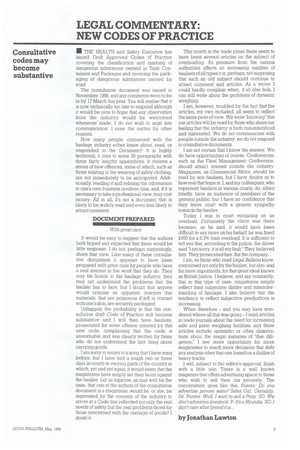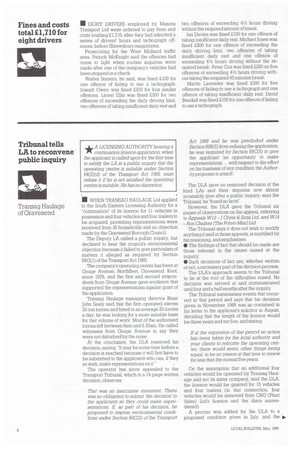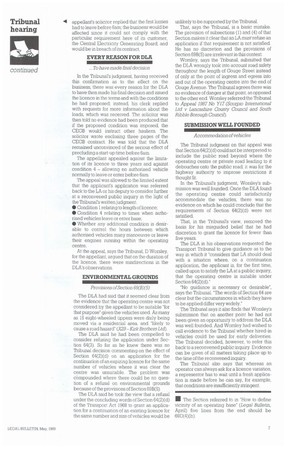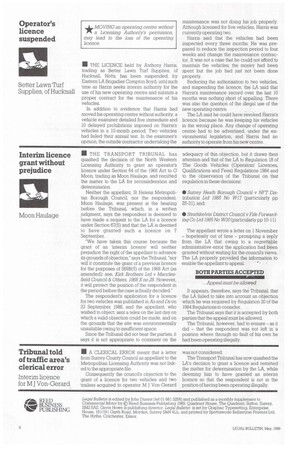LEGAL COMMENTARY: NEW CODES OF PRACTICE
Page 115

Page 116

Page 117

Page 118

If you've noticed an error in this article please click here to report it so we can fix it.
• THE HEALTH and Safety Executive has issued Draft Approved Codes of Practice covering the classification and marking of dangerous substances carried in Tank Containers and Packages and covering the packaging of dangerous substances carried by road.
The consultative document was issued in November 1988, and any comments were to be in by 17 March this year. You will realise that it is now technically too late to respond although it would be nice to hope that any observation from the industry would be welcomed whenever made. I do not wish to urge late communication: I raise the matter for other reasons.
How many people concerned with the haulage industry either knew about, read, or responded to the Document? It is highly technical; it runs to some 50 paragraphs with three fairly lengthy appendices; it creates a series of new offences, some of which, such as those relating to the wearing of safety clothing, are not immediately to be anticipated. Additionally, reading it and relating the information to one's own business involves time, and, if it is necessary to take a professional view, may cost money. All in all, it's not a document that is likely to be widely read and even less likely to attract comment.
It would be easy to suggest that the authors both hoped and expected that there would be little response. 1 do not, perhaps surprisingly, share that view. Like many of these consultative documents it appears to have been prepared with great care by people who have a real interest in the work that they do. They may be hostile to the haulage industry; they may not understand the problems that the haulier has to face; but I doubt that anyone would criticise an apparent concern that materials, that are poisonous if left in contact with one's skin, are securely packaged.
Unhappily the probability is that the consultative draft Code of Practice will become substantive and I will then have hauliers, prosecuted for some offence created by this new code, complaining that the code is unworkable and was clearly written by those who do not understand the first thing about carrying goods.
I am sorry to return to a song that I. have sung before, but I have had a rough two or three days in courts in varying parts of the country in which, yet and yet again, it would seem that the magistrates have simply set their faces against the haulier. Let us suppose, as may well be the case, that one of the authors of the consultative document is a magistrate; would he, or she, be impressed by the concern of the industry to arrive at a Code that reflected not only the real needs of safety but the real problems faced by those concerned with the carriage of goods? I doubt it. This month in the trade press there seem to have been several articles on the subject of overloading, As pressure from the various authorities affects an increasing number of hauliers of all types it is, perhaps, not surprising that such an old subject should continue to attract comment and articles. As a writer I could hardly complain when, if all else fails, I can still write about the problems of dynamic weighing.
I am, however, troubled by the fact that the articles, my awn included, all seem to reflect the same point of view. We write 'knowing' that our articles will be read by those who share our feeling that the industry is both misunderstood and mistreated. We do not communicate with people outside the industry; we do not respond to consultative documents.
I am not certain that I know the answer. We do have opportunities of course. Conferences, such as the Fleet Management Conference, should attract interest outside the industry. Magazines, as Commercial Motor, should be read by non hauliers, but I have doubts as to how real that hope is. I, and my colleagues, who represent hauliers in various courts, do, albeit briefly, have an audience of members of the general public, but I have no confidence that they leave court with a greater sympathy towards the haulier.
Today I was in court mitigating on an overload. Fortunately the client was there because, as he said, it would have been difficult to say more on his behalf; he was fined £450 for a 6.3% train overload. It is sufficient to tell you that, according to the police, the driver said "I am sorry, it is all my fault." They believed him. They prosecuted him. But the company...
I am, as those who read Legal Bulletin know, concerned not only for the haulier, but also, and far more importantly, for that great ideal known as British Justice. I believe, and say constantly, that in this type of case, magistrates simply reflect their subjective dislike and misunderstanding of haulage. I also believe that the tendency to reflect Subjective predjudices is increasing.
When therefore and you may have wondered where all this was going I read articles in trade journals about the need for increasing axle and plate weighing facilities, and those articles include optimistic or other observations about the magic panacea of "due diligence,'' I see more opportunity for more magistrates to reach more decisions that defy any analysis other that one based on a dislike of heavy trucks.
I will, subject to the editor's approval, finish with a little tale. There is a well known magazine that offers advertising space to those who wish to sell their car privately. The conversation goes like this. Punter: Do you advertise private sales? Sales Girl: Certainly. Sir. Punter: Well, I want to sell a Pony. SC: We don't advertise livestock P: It's a Hyundai. SG: I don't care what breed it k... III EIGHT DRIVERS employed by Masons Transport Ltd were ordered to pay fines and costs totalling £1,710, after they had admitted a series of drivers hours and tachograph offences, before Shrewsbury magistrates.
Prosecuting for the West Midland traffic area, Patrick McKnight said the offences had come to light when routine inquiries were made after one of the company's vehicles had been stopped in a check.
Walter Somers, he said, was fined £100 for one offence of failing to use a tachograph. Joseph Owen was fined £200 for four similar offences. Lionel Ellis was fined £300 for two offences of exceeding the daily driving limit, two offences of taking insufficient daily rest and 4,, A LICENSING AUTHORITY hearing a AR continuation licence application, when the applicant is called upon for the first time to satisfy the LA at a public inquiry that the operating centre is suitable under Section 64(2)(d) of the Transport Act 1968, must refuse it if he is not satisfied the operating centre is suitable. He has no discretion, 1111 WHEN TRANSAG HAULAGE Ltd applied to the South Eastern Licensing Authority for a "continuation" of its licence for 11 vehicles in possession and four vehicles and four trailers to be acquired, protesting representations were received from 39 households and an objection made by the Gravesend Borough Council.
The Deputy LA called a public inquiry, but declined to hear the council's environmental objection because it failed to give particulars of matters it alleged as required by Section 69G(1) of the Transport Act 1968.
The company's operating centre has been at Gouge Avenue, Northfleet, Gravesend, Kent, since 1978, and the first and second respondents from Gouge Avenue gave evidence that supported the representations against grant of the application.
Transag Haulage managing director Brian John Sealy said that the firm operated eleven 30-ton lorries and hired in an average 20 lorries a day; he was looking for a more suitable base for that volume of work. Most of the authorised lorries left between Sam and 6.30am. He called witnesses from Gouge Avenue to say they were not disturbed by the noise.
At the conclusion, the DLA reserved his decision, saying: "It may be some time before a decision is reached because it will first have to be submitted to the applicants who can, if they so wish, make representations on it."
The operator has since appealed to the Transport Tribunal, which in a 14-page written decision, observes: That was an inaccurate statement. There was no obligation to submit 'the decision' to the applicants so they could make representations. If, as part of his decision, he proposed to impose environmental condiiions under Section 69C(2) of the Transport two offences of exceeding 41/2 hours driving without the required amount of break.
Ian Davies was fined £100 for one offence of taking insufficient daily rest. Michael Jones was fined £200 for one offence of exceeding the daily driving limit, two offences of taking insufficient daily rest and one offence of exceeding 41/2 hours driving without the required break. Peter Cox was fined £250 on five offences of exceeding 4½ hours driving without taking the required 45 minutes break.
Martin Lavender was fined £300 for five offences of failing to use a tachograph and one offence of taking insufficient daily rest. David Bendall was fined £100 for one offence of failing to use a tachograph.
Act 1968 and he was precluded under Section 69B(5) from refusing the application, he was required by Section 69C(5) to give the applicant 'an opportunity to make representations. . . with respect to the effect on his business of any condition the Authority proposes to attach', The DLA gave no reasoned decision of the kind LAs and their deputies now almost invariably give after a public inquiry, says the Tribunal; he "found no facts".
However, the DLA gave the Tribunal six pages of observations on the appeal, referring to Appeals W12 Cryer & Sons Ltd, and W14 —Ron Chalker (The Potato Man) Ltd, The Tribunal says it does not wish to modify anything it said in those appeals, is mystified by his reasoning, and emphasises: • The findings of fact that should be made are those relevant to the issues raised at the inquiry; • Such decisions of fact are, whether written or not, a necessary part of the decision process.
The DLA's approach seems to the Tribunal to lie at the root of the difficulties raised. No decision was arrived at and communicated until four and a half months after the inquiry.
The Tribunal summarises events that occurred in that period and says that his decision given in November 1988 was as contained in his letter to the applicant's solicitor in August, deciding that the length of the licence would be three years and not five, and stating Mat the expiration of that penod no action has been taken by the local authority and your clients to relocate the operating centre, there would seem, other things being equal, to be.no reason at that time to renew for less than the normal five years.
On the assumption that an additional four vehicles would be operated by Transag Haulage and not its sister company, said the DLA, the licence would be granted for 15 vehicles and four trailers (in that connection, four vehicles would be removed from CRC (Plant Sales) Ltd's licence and the discs surrendered).
A proviso was added by the DLA to a proposed condition given in July, and the • appellant's solicitor replied that the first lorries had to leave before Sam; the business would be affected since it could not comply with the particular requirement here of its customer, the Central Electricity Generating Board, and would be in breach of its contract.
In the Tribunal's judgment, having received this confirmation as to the effect on the business, there was every reason for the DLA to have then made his final decision and issued the licence in the terms and with the conditions he had proposed; instead, his clerk replied with requests for more information about the loads, which was received. The solicitor was then told no evidence had been produced that if the proposed condition was imposed, the CEGB would instruct other hauliers. The solicitor wrote enclosing three pages of the CEGB contract. He was told that the DLA remained unconvinced of the serious effect of precluding a start-up time before Barn.
The appellant appealed against the limitation of its licence to three years and against condition 4 allowing no authorised vehicle normally to leave or enter before 6arn.
The appeal was allowed to the limited extent that the applicant's application was referred back to the LA or his deputy to consider further at a reconvened public inquiry in the light of the Tribunal's written judgment, • Condition I relating to length of licence, • Condition 4 relating to times when authorised vehicles leave or enter base; • Whether any additional condition is desirable to control the hours between which authorised vehicles many manoeuvre or leave their engines running within the operating centre.
At the appeal, says the Tribunal, D Worsley, for the appellant, argued that on the duration of the licence, there were misdirections in the DLA's observations.
The DLA had said that it seemed clear from the evidence that the operating centre was not considered by the appellant to be suitable "for that purpose" given the vehicles used. As many as 15 eight-wheeled tippers were daily being moved via a residential area, and "likely to cause a road hazard' (X29Kirk Brothers Ltd).
The DLA said he had been compelled to consider refusing the application under Section 64(3). So far as he knew there was no Tribunal decision commenting on the effect of Section 64(2)(d) on an application . for the continuation of an expiring licence for the same number of vehicles where it was clear the centre was unsuitable. The problem was compounded where there could be no question of a refusal on environmental grounds because of the provisions of Section 69B(5).
The DLA said he took the view that a refusal under the concluding words of Section 64(2)(d) of the Transport Act 1968 to grant an application for a continuation of an existing licence for the same number and size of vehicles would be unlikely to be supported by the Tribunal.
That, says the Tribunal, is a basic mistake. The provision of subsections (1) and (4) of that Section makes it clear that an LAmust refuse an application if that requirement is not satisfied. He has no discretion and the provisions of Section 69B(5) are irrelevant in this context.
Worsley, says the Tribunal, submitted that the DLA wrongly took into account road safety throughout the length of Gouge Street instead of only at the point of ingress and egress into and out of the operating centre into the end of Gouge Avenue. The Tribunal agrees there was no evidence of danger at that point, as opposed to the other end. Worsley referred the Tribunal to Appeal 1987 No Y17 (Scorpio International Ltd v Lancashire County Council and South Ribble Borough Council).
The Tribunal judgment on that appeal was that Section 64(2)(d) could not be interpreted to include the public road beyond where the operating centre or private road leading to it debouches onto the public road; it was for the highway authority to improse restrictions it thought fit.
In the Tribunal's judgment, Worsley's submission was well founded. Once the DLA found the operating centre could satisfactorily accommodate the vehicles, there was no evidence on which he could conclude that the requirements of Section 64(2)(d) were not satisfied.
That, in the Tribunal's view, removed the basis for his misguided belief that he had discretion to grant the licence for fewer than five years.
The DLA in his observations requested the Transport Tribunal to give guidance as to the way in which it "considers that LA should deal with a situation where, on a continuation application, the applicant is, for the first time, called upon to satisfy the LA at a public inquiry, that the operating centre is suitable under Section 64(2)(d)."
"No guidance is necessary or desirable", says the Tribunal. "The words of Section 64 are clear but the circumstances in which they have to be applied differ very widely.'
The Tribunal says it also finds that Worsley's submission that on another point he had not been given an opportunity to address the DLA was well founded, And Worsley had wished to call evidence to the Tribunal whether hired-in vehicles could be used for early deliveries. The Tribunal decided, however, to refer this back to a reconvened public inquiry. Evidence can be given of all matters taking place up to the time of the reconvened inquiry.
The Tribunal also says that whereas an operator can always ask for a licence variation, a representor has to wait until a fresh application is made before he can say, for example, that conditions are insufficiently stringent. 4,, MOVING an operating centre without " a Licensing Authority's permission, may lead to the loss of the operating licence.
II THE LICENCE held by Anthony Harris, trading as Better Lawn Turf Supplies, of Hucknall, Notts, has been suspended, by Eastern LA Brigadier Compton Boyd, until such time as Harris seeks interim authority for the use of his new operating centre and submits a proper contract for the maintenance of his vehicles.
In addition to evidence that Harris had moved his operating centre without authority, a vehicle examiner detailed five immediate and 10 delayed prohibitions imposed on Harris's vehicles in a 10-month period. Two vehicles had failed their annual test. In the examiner's opinion, the outside contractor undertaking the • THE TRANSPORT TRIBUNAL has quashed the decision of the North Western Licensing Authority to grant an operator's licence under Section 64 of the 1968 Act to G Moon, trading as Moon Haulage, and remitted the matter to the LA for reconsideration and determination.
Neither the appellant, St Helens Metropolitan Borough Council, nor the respondent, Moon Haulage, was present at the hearing before the Tribunal, which, in a written judgment, says the respondent is deemed to have made a request to the LA for a licence under Section 67(5) and that the LA is deemed to have granted such a licence on 7 September.
"We have taken this course because the grant of an 'interim licence will neither prejudice the right of the appellant to advance its grounds of objection" says the Tribunal, "nor will it constitute the grant of a previous licence for the purposes of S6913(5) of the 1968 Act (as amended): see, Kirk Brothers Ltd v Macclesfield Council & Others, 1968 X no 29 However, it will protect the position of the respondent in the period before the case is finally decided."
The respondent's application for a licence for two vehicles was published in As and Ds on 23 September 1988, and the appellant, who wished to object, sent a telex on the last day on which a valid objection could be made, and on the grounds that the site was environmentally unsuitable owing 'to insufficient space.
Since the Tribunal did not hear the parties, it says it is not appropriate to comment on the • A CLERICAL ERROR meant that a letter from Surrey County Council as appellant to the Metropolitan Licensing Authority was not linked to the appropriate file.
Consequently the council's objection to the grant of a licence for two vehicles and two trailers acquired to operator M J Von-Gerard maintenance was not doing his job properly. Although licensed for five vehicles, Harris was currently operating two.
Harris said that the vehicles had been inspected every three months. He was prepared to reduce the inspection period to four weeks and change the maintenance contractor. It was not a case that he could not afford to maintain the vehicles; the money had been spent but the job had Just not been done properly.
Reducing the authorisation to two vehicles, and suspending the licence, the LA said that Harris's maintenance record over the last 10 months was nothing short of appalling. There was also the question of the illegal use of the new operating centre.
The LA said he could have revoked Harris's licence because he was keeping his vehicles in the wrong place. Any change of operating centre had to be advertised, under the environmental legislation, and Harris had no authority to operate from his new centre.
adequacy of this objection, but it draws their attention and that of the LA to Regulation 18 of The Goods Vehicles (Operators' Licences, Qualifications and Fees) Regulations 1984 and to the observation of the Tribunal on that regulation in these decisions: • Surrey Heath Borough Council v NET Distribution Ltd 1985 No W17 (particularly pp 25-31), and: • Strathkelvin District Council v Fife Forwarding Co Ltd 1985 No W30 (particularly pp 10-11) The appellant wrote a letter on 1 November hopelessly out of time prompting a reply from the LA that owing to a regrettable administrative error the application had been granted without waiting for the council's views. The LA properly provided the information to enable the appellant to appeal. ""% •
























































































































